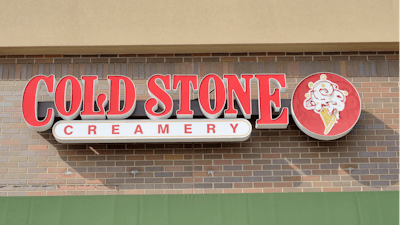
A federal judge in New York has given the go-ahead to a Long Island woman's class action lawsuit that claims consumers are being duped by Cold Stone Creamery when they purchase certain flavors that “do not contain their represented ingredients.”
Lead plaintiff Jenna Marie Duncan purchased her serving of pistachio ice cream from a Cold Stone Creamery store in Levittown, New York, in or around July 2022. According her lawsuit, Duncan "reasonably believed that the Pistachio ice cream she purchased from defendant contained pistachio.”
But Duncan later learned after reading the company's website there were no pistachios — a member of the cashew family — in the frozen dairy product, but rather “pistachio flavoring" that's defined as a mixture of water, Ethanol, Propylene Glycol, natural and artificial flavor, Yellow 5, and Blue 1, according to the lawsuit.
“When consumers purchase pistachio ice cream, they expect pistachios, not a concoction of processed ingredients,” Duncan's lawsuit reads, noting that competitors such as Haagen-Dazs use real pistachios in their ice cream.
Duncan also takes issue with the ingredients in Cold Stone's mango, coconut, orange, mint, butter pecan ice creams and its orange sorbet.
Should a consumer ordering pistachio ice cream expect actual pistachios?
Brown acknowledges in his ruling, which now allows the case to proceed, that Duncan's alleged claims of deceptive practices under New York's General Business Law “are plausible on their face" when it comes to the pistachio ice cream she purchased. The state's law prohibits “deceptive acts and practices in the conduct of any business, trade or commerce or in furnishing of any service.”
Messages were left seeking comment with lawyers for Kahala Franchising LLC, the parent franchiser of nearly 1,000 Cold Stone stores worldwide. One of the lawyers declined to comment on the case.
In court records, Kahala sought to have the case dismissed, arguing that a detailed list of the ice cream ingredients are published online. A regional director of operations for Kahala said in court records that no flavor placard at the Levittown location indicated the ice creams are “made with” any particular ingredient.
There have been numerous lawsuits filed over the years about products not living up to advertising hype, including suits against fast food restaurants for not providing big, juicy burgers or a soda not providing promised health benefits. There have also been lawsuits over products not containing ingredients they purport to contain.
Brown notes in his ruling that some of these disputes have led to an “etymological analysis” over whether a word such as vanilla is being used by a company as a noun to reflect an actual ingredient in a product, or simply as an adjective to describe a flavor.
But the judge acknowledged it's a tricky argument for an ice cream manufacturer to make when it comes to modern-day flavors, noting “when one orders a ‘Moose Tracks’ ice cream cone, the hoofprints of the largest member of the deer family linguistically acts as an adjective.”






















